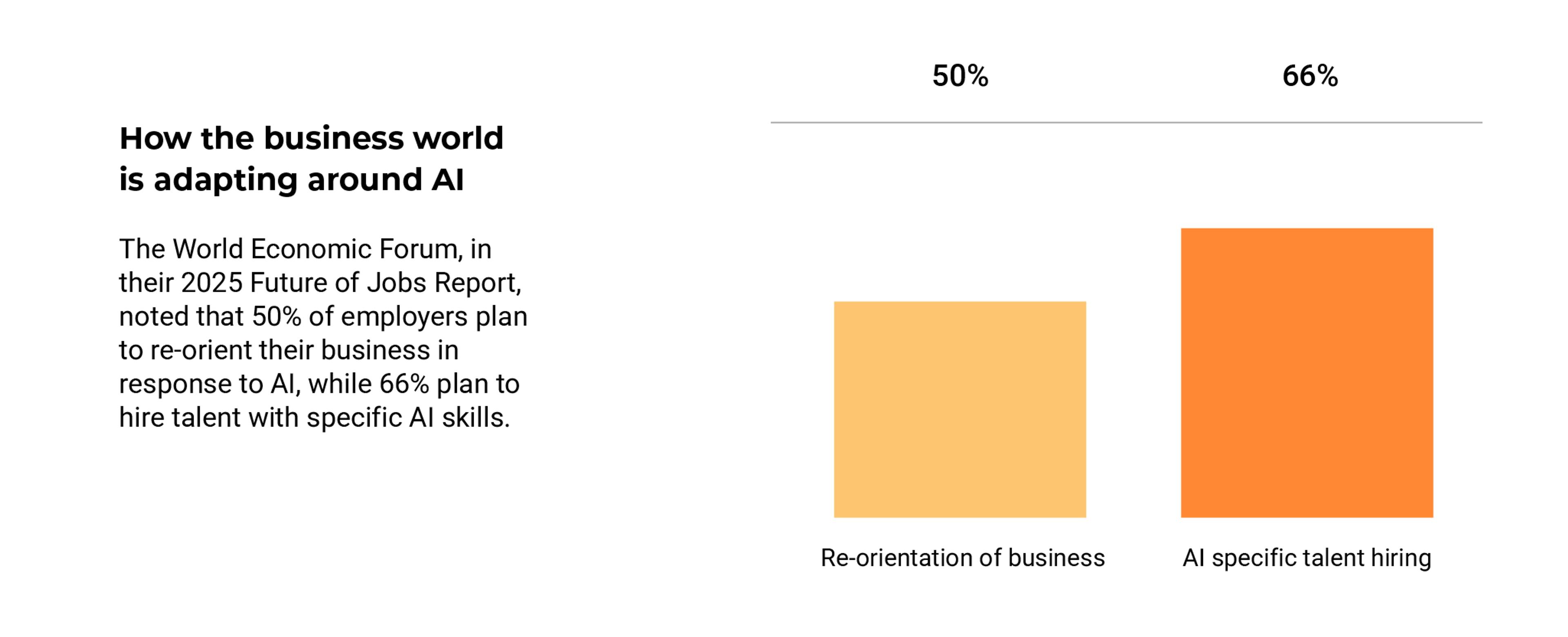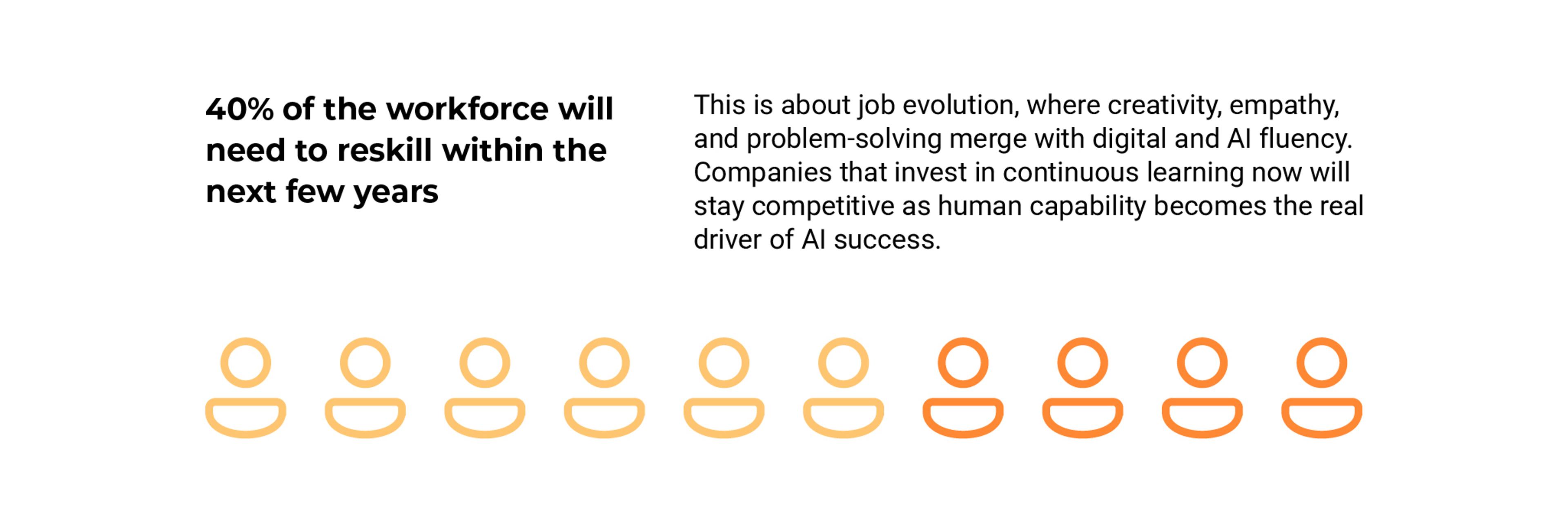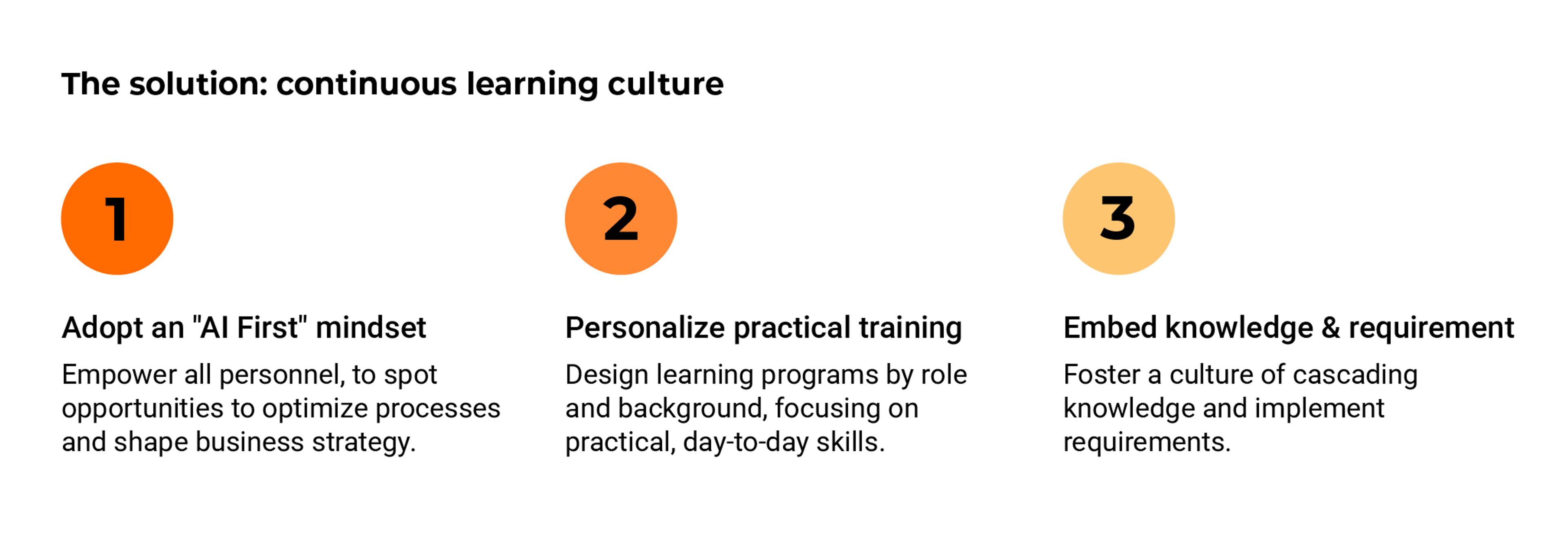

Eugenia Fiore
Chief People Officer
Article co-written with Juliana Rios—People & Culture Director
Few forces have challenged the status quo as swiftly and as profoundly as AI. In the world of work and education, this technology is transforming how we think about professional growth, and the very skills that define employability. As HR professionals at CloudX, we're witnessing firsthand how AI is rewriting the rules of workforce development and opportunity.
Governments and experts worldwide are sounding the alarm: AI literacy is now a gateway to opportunity. The U.S. Department of Labor recently stated: “We believe that AI literacy is the gateway to opportunity in an AI-driven economy”. The World Economic Forum, in their 2025 Future of Jobs Report, noted that 50% of employers plan to re-orient their business in response to AI, while 66% plan to hire talent with specific AI skills.

Meanwhile, companies are grappling with major skills gaps. A late 2024 IBM survey found that 47% of executives say their people lack the knowledge and skills to effectively implement and scale AI across their businesses. Similarly, Deloitte found that 68% of executives reported a “moderate-to-extreme” skills gap, with 27% rating their skills gap as “major” or “extreme”. According to IBM, business leaders estimate that 40% of their workforce will need to reskill in the next few years as a result of implementing AI, predicting that AI won’t replace people as much as AI-literate people will.
Upskilling is an urgent imperative for organizations seeking to remain competitive.

While technical AI skills are important, automation is making high-value human skills more critical than ever. Creative thinking, complex problem-solving, emotional intelligence, and adaptability have always been valuable, but in the age of AI their value takes on a new dimension. In hybrid teams (where humans and AI agents collaborate side by side) everyone becomes a “manager” of sorts. People must not only know how to perform a task, but also which tasks to delegate to AI agents, how to perfectly instruct those agents, and how to review and provide feedback on their output.
This shift opens the door to new meta-skills: employees must focus on framing problems, asking better questions, and prompting effectively. Meta-skills blend technical and human insights, and they’ll be essential in the work landscape of the coming years.
At CloudX, we believe learning is an ongoing part of work life. Lessons learned are shared inside our company everyday. We’ve built a culture of cascading knowledge, sharing, and making it part of our DNA. Not so long ago, upskilling might have been siloed within technical chapters or verticals, but today, AI tools touch every role. Everyone must be involved
Client expectations and demands are evolving as well. Years ago, the focus was on employee retention and low attrition. Now, many searches are about optimizing the workforce, becoming smarter and more efficient. The market still values traditional profiles, but knowledge accumulation is not enough without practical, day-to-day skills and adaptability.
Our company-wide AI training program was born from a simple philosophy: empower our people to think differently and prepare for a future where AI skills are indispensable. We projected that, within a few years, those without these tools would struggle to remain relevant—both at CloudX and in the broader market. The goal was not just to train our team on theoretical knowledge, but to empower them with practical skills that enable everyone to spot opportunities to optimize processes within the company and for our clients. Besides, we wanted our entire team’s participation in shaping our business. During the past years we’ve been adopting the AI First mindset, so we wanted everyone to understand and get involved in this philosophy.

We designed the program by role (Staff, Devs, UX, QA), personalizing tracks to each person’s background. Developers, for example, could choose from different course options based on their previous experience with AI. Our R&D Department played a critical role not only in narrowing down the wide range of available courses, but also in sharing knowledge to the rest of the company through workshops, internal talks, and other forums where team members discuss both technical and general AI topics, ensuring everyone stays informed and engaged.
Implementing such a program came with some challenges. While everyone was very receptive and enthusiastic about the initiative, some people juggling demanding projects found it hard to get started.
We know our team, so we were confident this initiative would be well received. Feedback was overwhelmingly positive. Many asked for more training, and some even suggested new courses. We now require all new hires to complete AI certification within their first three months, and we’re committed to ongoing upskilling for everyone.
As technology advances at such a rapid pace, the only constant is change. It sounds cliche, but it’s true. Continuous education and upskilling sets the foundation. AI’s speed and constant evolution can be daunting, but we shouldn’t let it paralyze us. We must remain agile, learning and adapting as today’s knowledge quickly evolves. Much of our skillset will need to evolve in order to remain relevant in an AI-driven workplace. Continuous learning keeps us updated and ready for what’s next. The more knowledge we acquire (practical and purposeful), the more possibilities we unlock: for our people, our clients, and the future of work itself.

Insights
CloudX announced today that more than 300 of its employees worldwide are now AI-certified, making it the first company to achieve full AI accreditation across…

Insights
In 2025, we are on the verge of a work revolution, as technology and human aspirations are reshaping our professional lives. This article reflects on how AI…

Insights
For decades, software development has been defined by craftsmanship. Yet, let’s face facts: we’re still in the stone age of our discipline. Each line of code…